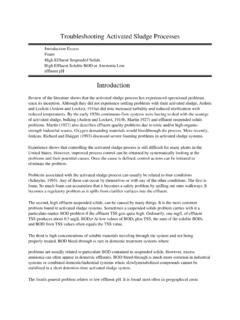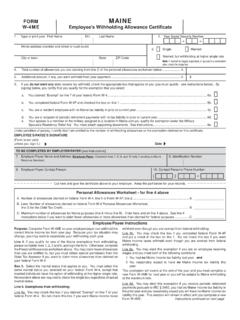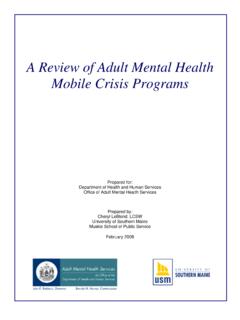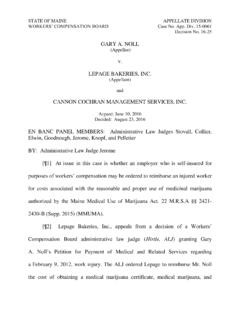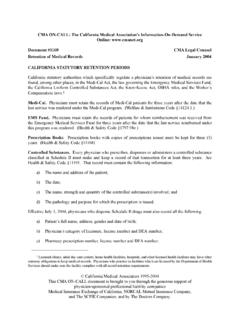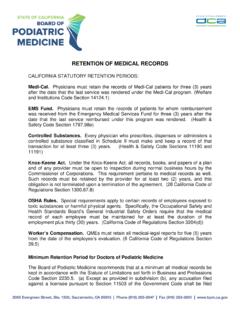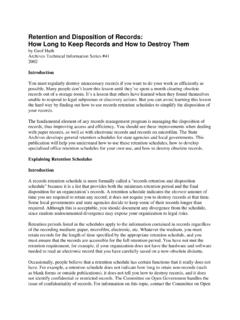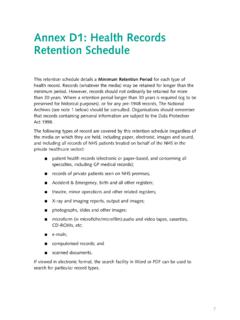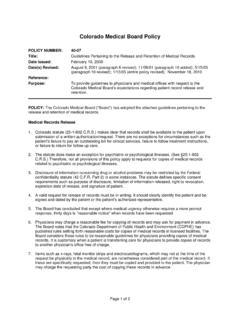Transcription of CHAPTER VI: RETENTION OF HEALTH RECORDS - Maine
1 Rev. 3/06 6-1 RETENTION CHAPTER --MeHIMA CHAPTER VI: RETENTION OF HEALTH RECORDS Disclaimer: The information contained in this CHAPTER is not intended to be used as legal advice. Please refer to the most current specific state statutes and your own legal counsel when warranted. Statutes may be referred to throughout this CHAPTER . FEDERAL REQUIREMENTS There is no federal law which mandates a specific RETENTION period for HEALTH RECORDS . Hence, RETENTION schedules for HEALTH RECORDS are governed by state laws, requirements of regulatory agencies, the statute of limitations, and the healthcare provider's own The State of Maine has no laws regarding record RETENTION , although RETENTION of hospital RECORDS is covered in the Department of HEALTH and Human Services' hospital licensing regulations. HOSPITAL LICENSING REGULATIONS The Regulations for the Licensure of General and Specialty Hospitals in the State of Maine state: RECORDS Maintenance RECORDS shall be maintained for each person receiving service at the hospital or its extended service sites.
2 RECORDS shall be preserved, either on paper or by other electronic/optical means, for a period of seven (7) years. If the patient is a minor, the record must be retained for at least six (6) years past the age of majority. RECORDS must be secured in a manner that provides protection from unauthorized access, use, or damage. These regulations do not apply to healthcare providers other than hospitals. In particular, there is no state law or regulation covering RETENTION of physicians' office RECORDS . However, if the physician s office is now owned by a hospital or is somehow under the hospital s administrative control, it must follow the hospital s record RETENTION policies. MeHIMA recommends that facilities other than hospitals follow the Hospital Licensing Regulations listed above. 1 AHIMA Position Statement on RETENTION of HEALTH Information, June 2002.
3 Rev. 3/06 6-2 RETENTION CHAPTER --MeHIMA EXCEPTIONS TO RETENTION RATES 1. State of Maine regulations require that radiology reports be maintained permanently. 2. Medicare Secondary Payer Questionnaires (MSP forms) are to be kept for 10 years. REGULATORY AGENCIES Medicare's Conditions of Participation require that HEALTH RECORDS be retained for at least five years, or longer if required by state or local laws. The Joint Commission on Accreditation of Healthcare Organizations does not mandate a specific RETENTION period. It should be noted that employee HEALTH RECORDS are covered by an extensive and complex set of regulations issued by the Occupational Safety and HEALTH Administration. These require that RECORDS of any employee's occupational exposure to blood-borne pathogens must be retained for the duration of employment, plus 30 years. The manager of the healthcare facility's employee HEALTH service should be familiar with this and other OSHA requirements.
4 STATUTE OF LIMITATIONS Each state has a statute of limitations which specifies the period of time during which malpractice litigation may be initiated. The statute is important to HEALTH information professionals because once the time period has expired, a patient's HEALTH RECORDS are no longer needed for defense against litigation, although they may well be needed for continuing care or for research. Maine 's statute of limitations is as follows: Actions for professional negligence shall be commenced within 3 years after the cause of action accrues. For the purposes of this section, a cause of action accrues on the date of the act or omission giving rise to the injury. Notwithstanding the provisions of Title 4 853, relating to minority, actions for professional negligence by a minor shall be commenced within 6 years after the cause of the action accrues or within 3 years after the minor reaches the age of majority, whichever first occurs.
5 This section does not apply where the cause of action is based upon the leaving of a foreign object in the body in which case the cause of the action shall accrue when the plaintiff discovers or reasonably should have discovered the harm. For the purposes of this section, the term "foreign body" does not include a chemical compound, prosthetic aid or object implanted or permitted to remain in the patient's body as a part of the HEALTH care for professional services .. If the provision in this section reducing the time allowed for a minor to bring a claim is found to be void or otherwise invalidated by a court of proper jurisdiction, then the statute of limitations for professional negligence shall be 2 years after the cause of action accrues, except that no claim brought under the 3- year statute may be extinguished by the operation of this paragraph. (24 MRSA 2902) Thus, from the standpoint of legal defense, HEALTH RECORDS of adults should be retained for a minimum of six years, and those of minors should be retained until the minor reaches age 21.
6 This applies to RECORDS of all Rev. 3/06 6-3 RETENTION CHAPTER --MeHIMA healthcare providers, including physician office RECORDS . NOTE: HAD quaisai municipalities have a different statute of limitations. The patient has six months after the date of the incident to notify the hospital that they intend to bring a claim against the facility. The patient then has two years to file suit. PROVIDER S NEEDS Finally, the needs of the individual healthcare provider should be considered in developing a record RETENTION schedule. If the provider's RECORDS are fully computerized and can be easily archived to optical or magnetic media, the RECORDS should probably be retained on a permanent basis. If the provider's RECORDS are paper-based, but the technology is available to store them on optical disk or to microfilm them, then permanent RETENTION would also be advisable.
7 When the resources are not available to convert paper RECORDS to other media, but space limitations prohibit permanent RETENTION of RECORDS , providers must weigh the advantages and disadvantages of several different options. Inactive paper RECORDS could be stored off-site; inactive RECORDS could be thinned, destroying less important documents but retaining the vital ones; or inactive RECORDS could be destroyed in toto. Examples of some RECORDS that facilities may want to consider saving are summaries of care for genetic reasons or for criminal investigations and possibly immunization RECORDS . In any case, RETENTION and destruction protocols or procedures should be clearly documented in each facility s policies. AHIMA POSITION STATEMENT The American HEALTH Information Management Association issued a Position Statement on RETENTION of HEALTH Information in March 1994, Rev.
8 June 2002. The following is an excerpt from that statement: Patient HEALTH information must be available to meet the needs of continued patient care, legal requirements, research, education, and other legitimate uses. Each healthcare provider should develop a RETENTION schedule for patient HEALTH information that meets the needs of its patients, physicians, researchers, and other legitimate users, and complies with legal, regulatory, and accreditation requirements. Providers should develop guidelines that specify what information should be kept, the time period for which it should be kept, and the storage medium (paper, microfilm, optical disk, magnetic tape, or other). In the absence of specific state requirements for record RETENTION , providers should keep HEALTH information for at least the period specified by the state's statutes of limitations.
9 A longer RETENTION period is prudent, since the statute may not begin to run until the potential plaintiff learns of the causal relation between an injury and the care received. If the patient was a minor, the provider should retain HEALTH information until the patient reaches the age of majority (as defined by state law) plus the period of the statute of limitations, unless otherwise provided by state law. Rev. 3/06 6-4 RETENTION CHAPTER --MeHIMA Unless longer periods of time are required by state or federal law, the American HEALTH Information Management Association recommends that patient HEALTH information be retained for the following minimum time periods: Patient HEALTH RECORDS (adults) Patient HEALTH RECORDS (minors) Diagnostic images (such as x-ray film) Disease index Fetal heart monitor RECORDS Master patient index Operative index Physician index Register of births Register of deaths Register of surgical procedures Radiology reports 10 years after the most recent encounter Age of majority plus statute of limitations 5 years 10 years 10 years after infant reaches age of majority Permanently 10 years 10 years Permanently Permanently Permanently Permanently DESTRUCTION OF RECORDS When medical RECORDS are to be destroyed, it is important that everyone involved in the process be committed to protecting patient confidentiality.
10 If the RECORDS are to be processed by an independent contractor, the HEALTH information manager should ensure that protection of confidentiality is emphasized in the service contract. Require a certificate of destruction from the contractor. Note: A business associate agreement is required with any independent contractor who has access to PHI. (See the manual CHAPTER on HIPAA.) If a contractor is not used, maintain a log of what RECORDS were destroyed, how they were destroyed, and when. FACILITY CLOSURE When the decision is made to close a healthcare facility, the governing board should give careful thought to preserving and protecting the facility's HEALTH RECORDS . Ideally, RECORDS would be transferred to another healthcare facility, where they would be made available to patients and their healthcare providers and where they would be subject to the same RETENTION schedule as the facility's own RECORDS .

